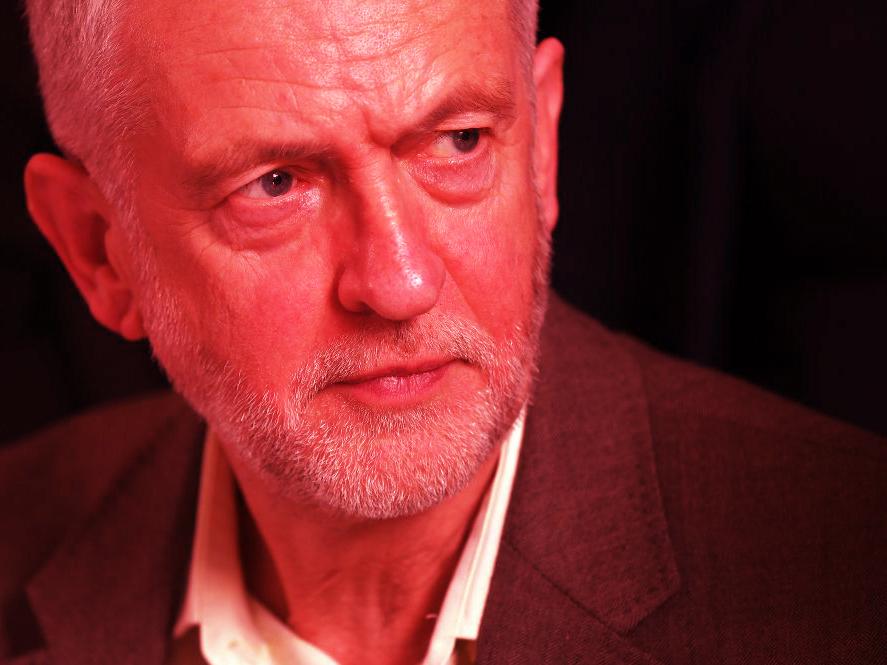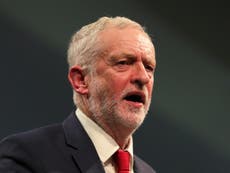What is the row over Jeremy Corbyn and antisemitism about?
Labour leader facing 'unprecedented' protests over his response to anti-Jewish sentiment in party

Your support helps us to tell the story
From reproductive rights to climate change to Big Tech, The Independent is on the ground when the story is developing. Whether it's investigating the financials of Elon Musk's pro-Trump PAC or producing our latest documentary, 'The A Word', which shines a light on the American women fighting for reproductive rights, we know how important it is to parse out the facts from the messaging.
At such a critical moment in US history, we need reporters on the ground. Your donation allows us to keep sending journalists to speak to both sides of the story.
The Independent is trusted by Americans across the entire political spectrum. And unlike many other quality news outlets, we choose not to lock Americans out of our reporting and analysis with paywalls. We believe quality journalism should be available to everyone, paid for by those who can afford it.
Your support makes all the difference.Jewish community leaders have held a demonstration outside Parliament in protest at antisemitism in the Labour Party and Jeremy Corbyn’s response to it.
They accused Mr Corbyn of “doing nothing to understand or address” anti-Jewish sentiment in the party and said: “Again and again, Jeremy Corbyn has sided with antisemites rather than Jews.”
Mr Corbyn has admitted there are “pockets” of antisemitism in Labour but said he was fully committed to eradicating it. He apologised for the “pain and hurt” caused to Jewish people.
When did the row over Jeremy Corbyn and antisemitism begin, and how did it develop?
During the 2015 leadership contest in which he was elected as Labour leader, concerns were raised about Mr Corbyn’s links to a number of known antisemites and, in particular, his previous reference to militant groups Hezbollah and Hamas as his “friends”.
The then candidate faced questions over his links to Holocaust denier Paul Eisen, and his description of cleric Raed Salah, who had claimed Jews drink the blood of children, as an “honoured citizen”. At the time, Mr Corbyn’s campaign team said he unequivocally condemned all antisemitism.
Since then there have been a number of incidents involving other Labour figures and antisemitism.
In April 2016, it was revealed that Labour MP Naz Shah had previously said Israel should be “relocated” to the US and posted a message saying “the Jews are rallying”. She was suspended by Labour but made a full apology, admitted her comments had been “ignorant” and antisemitic, and was readmitted to the party.
In the same month, former London mayor Ken Livingstone provoked fury after claiming Nazi leader Adolf Hitler had supported Zionism. He was suspended by the party but has consistently defended his comments, claiming he was simply stating historical facts.
The two incidents prompted Mr Corbyn to commission an independent inquiry into antisemitism in the Labour Party, chaired by human rights campaigner Shami Chakrabarti.
The investigation concluded that, while there was an “occasionally toxic atmosphere”, the Labour Party was not “overrun by antisemitism, Islamophobia or other forms of racism”.
However, the independence of Ms Chakrabarti’s report was called into question when, two months after its publication, she was given a peerage by Mr Corbyn and appointed to the Shadow Cabinet.
Around the same time, allegations were raised about antisemitism in the Oxford University Labour Club, including claims that members had referred to Jews as “Zios” and suggested attacks on Jewish people in Europe were legitimate.
An investigation by Labour peer Baroness Royall found there had been “some incidents” of antisemitic behaviour but that there was “no evidence the club is itself institutionally antisemitic”.
In September 2016, Jackie Walker, a left-wing activist and vice chair of the pro-Corbyn Momentum group, was suspended by Labour after suggesting Jews were responsible for funding the slave trade. A number of other prominent activists have also been suspended for an array of antisemitic remarks.
A year later, Labour’s 2017 conference was overshadowed by an antisemitism row when a speaker at a fringe event proposed party members should be able to debate whether the Holocaust actually happened.
What prompted the latest row?
The latest controversy was triggered by a series of stories about Mr Corbyn himself. The Labour leader was revealed to have been a member of several Facebook groups in which members had shared antisemitic comments and images. He appeared not to have condemned the posts or removed himself from the groups until he became Labour leader.
A spokesman for Mr Corbyn said he had been added to the groups without his knowledge.
The row deepened after revelations that, in 2012, Mr Corbyn had argued that an antisemitic mural should not be removed from a wall in the Tower Hamlets.
The painting depicted several wealthy Jews playing Monopoly, with the board resting on the bowed, naked backs of workers.
In response to the artist’s Facebook post about the image being removed, Mr Corbyn wrote: “Why?...You are in good company. Rockerfeller [sic] destroyed Diego Viera’s [sic] mural because it includes a picture of Lenin."
The Labour leader said last week that he “sincerely regrets” not looking “more closely” at the mural, which he admitted was “deeply disturbing and antisemitic”.
He added: “I am opposed to the production of antisemitic material of any kind, and the defence of free speech cannot be used as a justification for the promotion of antisemitism in any form.”
What do Mr Corbyn’s critics say?
That he has done nowhere near enough to address antisemitism in the party, and has previously refused to properly apologise for his own comments that have been deemed offensive to Jews.
Opponents say Labour under his leadership is too slow to address allegations of antisemitism, with some disciplinary cases taking more than a year to conclude.
They also point to the fact that some Labour members found to have made anti-Jewish comments appear to have been let off with a slap on the wrist. Some members previously suspended for antisemitism have been readmitted to the party.
In a strongly-worded statement issued on Sunday, Jewish community groups the Board of Deputies and Jewish Leadership Council said they would be organising a protest against antisemitism in Labour, and claimed Mr Corbyn “personifies” the “problems and dangers” of left-wing antisemitism.
They wrote: “He issues empty statements about opposing antisemitism, but does nothing to understand or address it. We conclude that he cannot seriously contemplate antisemitism, because he is so ideologically fixed within a far-left worldview that is instinctively hostile to mainstream Jewish communities.
“Again and again, Jeremy Corbyn has sided with antisemites rather than Jews. At best, this derives from the far left's obsessive hatred of Zionism, Zionists and Israel. At worst, it suggests a conspiratorial worldview in which mainstream Jewish communities are believed to be a hostile entity, a class enemy.”
Labour MP John Mann, who chairs the All-Party Parliamentary Group Against Antisemitism told the BBC on Monday: “If [Mr Corbyn] is incapable of dealing with this problem now, then the Labour Party is not going to survive.
“The Labour party was formed to deal with prejudice and discrimination. It’s been in our DNA through our 100 and more years’ history. If he fails to deal with this, then he destroys the very essence of the Labour party.“
His colleague, Wes Streeting, who chairs the All-Party Parliamentary Group on British Jews, told LBC: ”The fact that [Mr Corbyn] said the word 'sorry' is long overdue.
“Last week, Jeremy Corbyn had the opportunity to apologise for the comments he made underneath an image which was, I'm afraid, blatantly antisemitic.
”The explanation that 'Oh I didn't notice it was antisemitic' really doesn't wash. It was an antisemitic image, the kind of which would be seen in any history text book of Nazi propaganda.
“The 'sorry for the hurt caused to the Jewish community' doesn't quite cut it when, for years now, concerns have been raised directly with Jeremy Corbyn.”
What do Mr Corbyn and his supporters say?
Mr Corbyn and his team insist he has spent decades campaigning against all forms of racism and discrimination, including antisemitism.
They say the party under his leadership has taken a “no tolerance” approach to anti-Jewish acts and comments and point out that he supported a rule change, proposed by the Jewish Labour Movement, to make it easier for action to be taken against party members found to have been antisemitic.
Many of Mr Corbyn’s allies and supporters have claimed the row is manufactured by his political opponents as an attempt to undermine – an allegation furiously denied by Labour MPs and Jewish community leaders.
Len McCluskey, general secretary of the Unite trade union and a staunch ally of Mr Corbyn, called the allegations of antisemitism“mood music created by people who were trying to undermine Jeremy Corbyn”.
A 2016 poll found 55 per cent of Labour members thought antisemitism in the party was “not a serious problem at all, and is being hyped up to undermine Labour and Jeremy Corbyn, or to stifle legitimate criticism of Israel”. Only 9 per cent said it was a “serious and genuine problem”.
This weekend, Mr Corbyn went further than his previous statements, admitting there were “pockets” of antisemitism in the Labour Party and saying he was “sincerely sorry” for the “pain and hurt” this has caused Jewish people.
He added: “We are campaigning to increase support and confidence in Labour among Jewish people in the UK. I know that to do so, we must demonstrate our total commitment to excising pockets of antisemitism that exist in and around our party.
I will be meeting representatives from the Jewish community over the coming days, weeks and months to rebuild that confidence in Labour as a party which gives effective voice to Jewish concerns and is implacably opposed to antisemitism in all its forms.”

Join our commenting forum
Join thought-provoking conversations, follow other Independent readers and see their replies
Comments